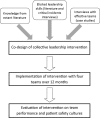Collective leadership and safety cultures (Co-Lead): protocol for a mixed-methods pilot evaluation of the impact of a co-designed collective leadership intervention on team performance and safety culture in a hospital group in Ireland
- PMID: 29101137
- PMCID: PMC5695301
- DOI: 10.1136/bmjopen-2017-017569
Collective leadership and safety cultures (Co-Lead): protocol for a mixed-methods pilot evaluation of the impact of a co-designed collective leadership intervention on team performance and safety culture in a hospital group in Ireland
Abstract
Introduction: There is accumulating evidence implicating the role of leadership in system failures that have resulted in a range of errors in healthcare, from misdiagnoses to failures to recognise and respond to patient deterioration. This has led to concerns about traditional hierarchical leadership structures and created an interest in the development of collective ways of working that distribute leadership roles and responsibilities across team members. Such collective leadership approaches have been associated with improved team performance and staff engagement. This research seeks to improve our understanding of collective leadership by addressing two specific issues: (1) Does collective leadership emerge organically (and in what forms) in a newly networked structure? and (2) Is it possible to design and implement collective leadership interventions that enable teams to collectively improve team performance and patient safety?
Methods and analysis: The first phase will include a social network analysis, using an online survey and semistructured interviews at three time points over 12 months, to document the frequency of contact and collaboration between senior hospital management staff in a recently configured hospital group. This study will explore how the network of 11 hospitals is operating and will assess whether collective leadership emerges organically. Second, collective leadership interventions will be co-designed during a series of workshops with healthcare staff, researchers and patient representatives, and then implemented and evaluated with four healthcare teams within the hospital network. A mixed-methods evaluation will explore the impact of the intervention on team effectiveness and team performance indicators to assess whether the intervention is suitable for wider roll-out and evaluation across the hospital group.
Ethics and dissemination: Favourable ethical opinion has been received from the University College Dublin Research Ethics Committee (HREC-LS-16-116397/LS-16-20). Results will be disseminated via publication in peer-reviewed journals, national and international conferences, and to relevant stakeholders and interest groups.
Keywords: co-design; collective leadership; health systems research.; intervention design; safety cultures.
© Article author(s) (or their employer(s) unless otherwise stated in the text of the article) 2017. All rights reserved. No commercial use is permitted unless otherwise expressly granted.
Conflict of interest statement
Competing interests: None declared.
Figures
References
-
- World Health Organization. The world health report 2000: health systems: improving performance: World Health Organization, 2000.
-
- McAuliffe E. Clinical governance in the Irish health system – a review of progress. Clinical governance: an international journal 2014;19:296–313. 10.1108/CGIJ-09-2014-0029 - DOI
-
- Madden D. Building a culture of patient safety. Report of the commission on patient safety and quality assurance. Dublin, Ireland: Department of Health and Children, 2008. http://health.gov.ie/wp-content/uploads/2014/03/en_patientsafety.pdf (accessed 1 Aug 2017).
-
- O’Shea Y. Clinical Directorates in the Irish Health Service: Managing Resources and Patient Safety: Orpen Press, 2009.
-
- Higgins JR. The establishment of hospital groups as a transition to independent hospital trusts. Department of Health and Children, Dublin, Ireland 2013.
Publication types
MeSH terms
LinkOut - more resources
Full Text Sources
Other Literature Sources
Medical

